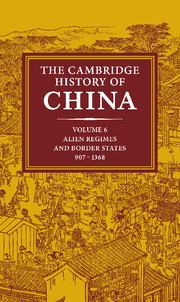Book contents
- Frontmatter
- Introduction
- 1 The Liao
- 2 The Hsi Hsia
- 3 The Chin dynasty
- 4 The rise of the Mongolian empire and Mongolian rule in north China
- 5 The reign of Khubilai khan
- 6 Mid-Yüan politics
- 7 Shun-ti and the end of Yüan rule in China
- 8 The Yüan government and society
- 9 Chinese society under Mongol rule, 1215–1368
- Bibliographical essays
- Bibliography
- Glossary-Index
- MAP 7. The Liao empire, ca. 1045
- MAP 12. The Hsi Hsia state, IIII
- Map 17. The Chin empire
- MAP 32. The Yüan empire">
Introduction
Published online by Cambridge University Press: 28 March 2008
- Frontmatter
- Introduction
- 1 The Liao
- 2 The Hsi Hsia
- 3 The Chin dynasty
- 4 The rise of the Mongolian empire and Mongolian rule in north China
- 5 The reign of Khubilai khan
- 6 Mid-Yüan politics
- 7 Shun-ti and the end of Yüan rule in China
- 8 The Yüan government and society
- 9 Chinese society under Mongol rule, 1215–1368
- Bibliographical essays
- Bibliography
- Glossary-Index
- MAP 7. The Liao empire, ca. 1045
- MAP 12. The Hsi Hsia state, IIII
- Map 17. The Chin empire
- MAP 32. The Yüan empire">
Summary
The four regimes that form the subject matter of this volume have generally received negative treatment from traditional Chinese historians and have been viewed as an interruption in the grand sweep of Chinese history. Each was established by a non-Chinese ruling group, who maintained their own cultural identity while ruling over a multiethnic state including large Han Chinese populations, and each controlled large territories that had long been ruled by Chinese. Each regime presented a challenge to the integrity of Chinese culture and to China's deeply rooted assumptions about its cultural supremacy and international order.
Yet these regimes were remarkably successful. The Khitan Liao dynasty lasted longer than had any previous Chinese dynasty except for the Han and the T'ang. For more than a century after the fall of the T'ang dynasty in 907, the Tangut in northern Shensi and Kansu clung tenaciously to the regional authority that they had acquired under the late T'ang and then formed their own empire of Hsia, which as an independent state survived for two centuries more. More than two centuries after the collapse of Khitan power, the official historians of the Mongolian Yüan court grudgingly conceded to the Liao the title of a legitimate dynasty but denied that status to Hsia, who would seem to us to have had almost as good a claim. Both were long-lasting, stable regimes, firmly rooted in territories that had been in part settled by Han Chinese for a millennium, and both regimes survived in the face of a hostile Chinese regime, the Sung, whose population outnumbered them twenty to one and whose economic resources were even more overpoweringly superior.
- Type
- Chapter
- Information
- The Cambridge History of China , pp. 1 - 42Publisher: Cambridge University PressPrint publication year: 1994
- 3
- Cited by



